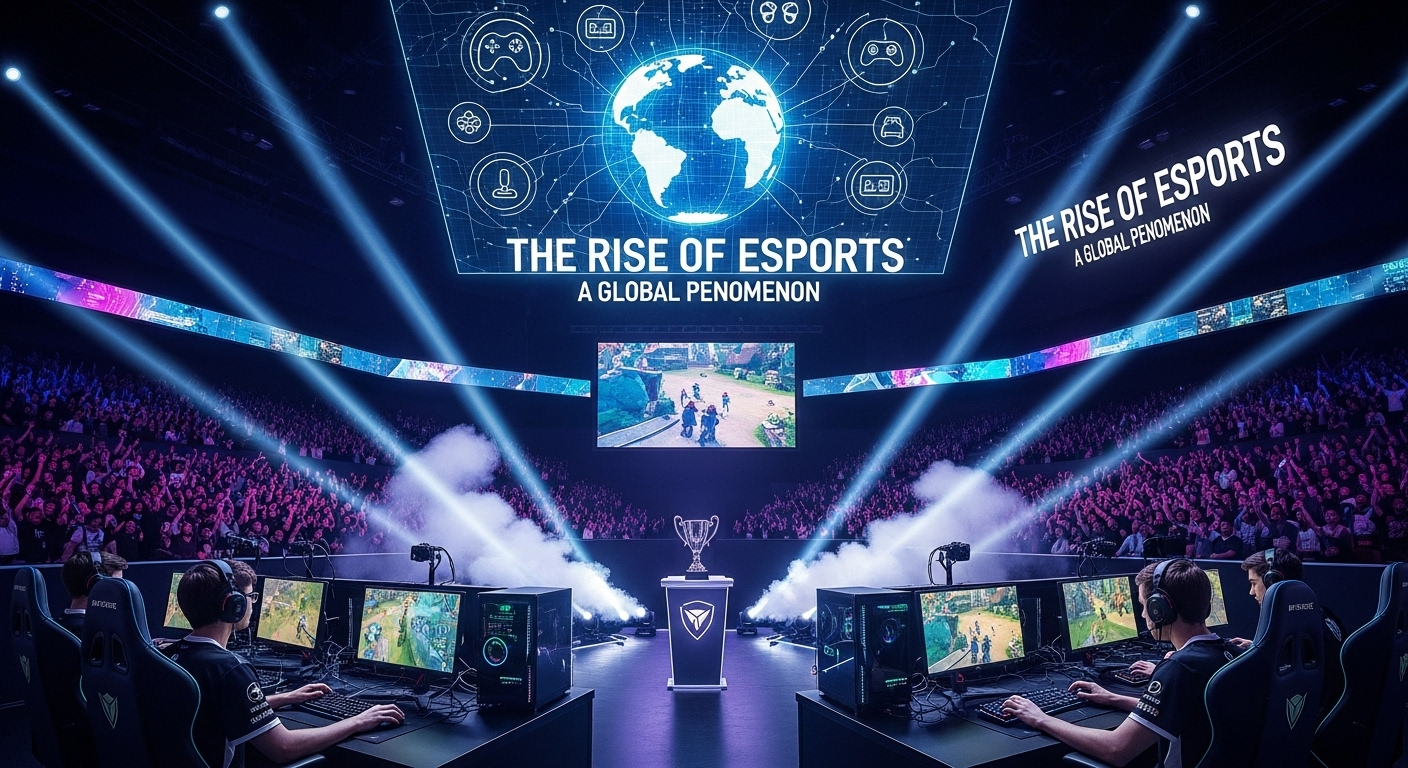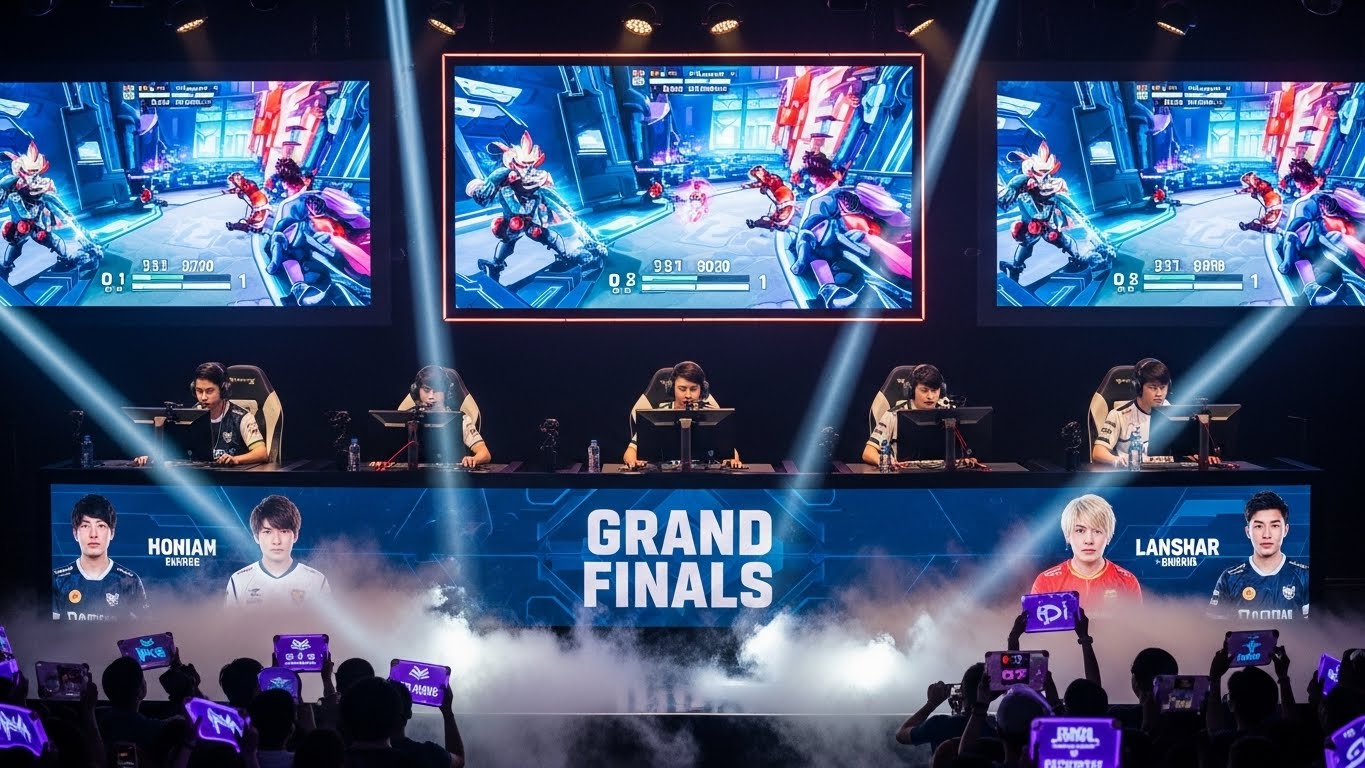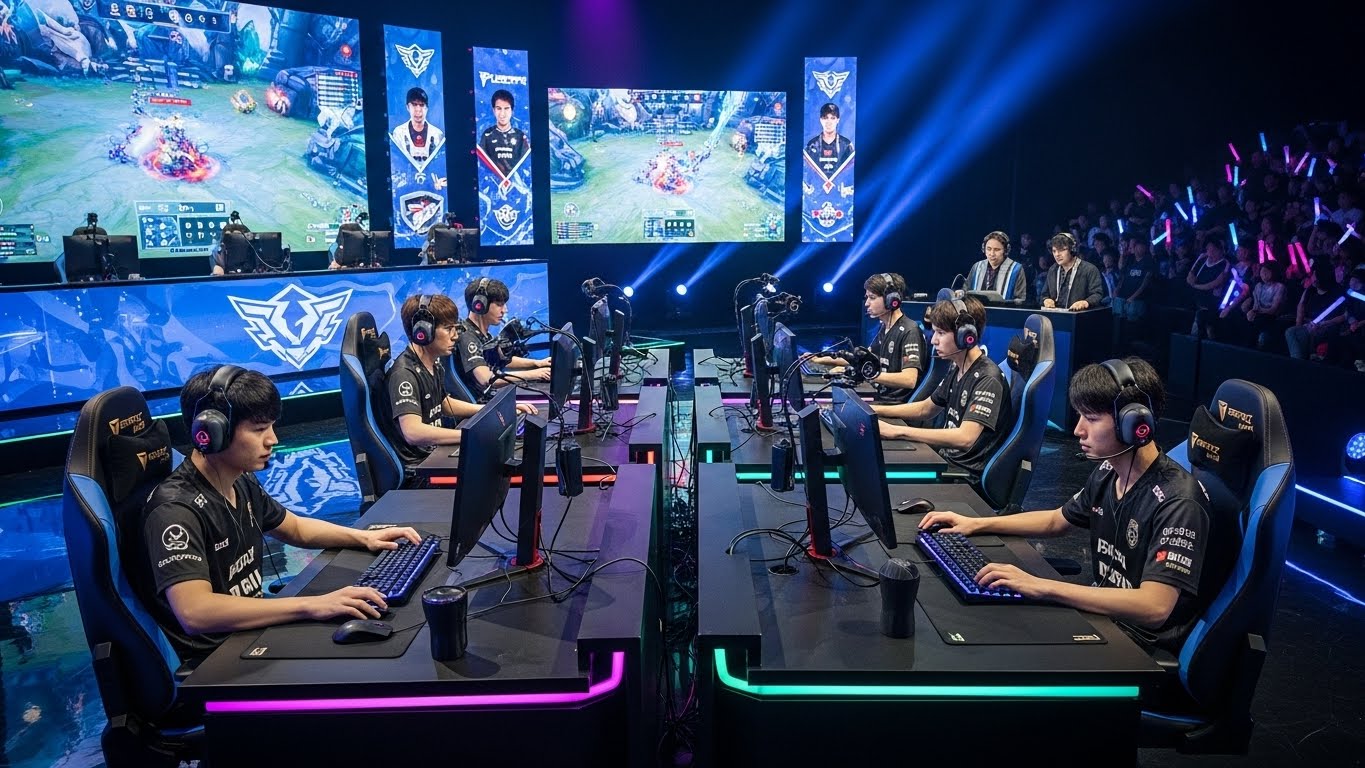Introduction
In the past few decades, the world has witnessed an incredible transformation in entertainment, technology, and sports. One of the most remarkable developments in this era has been the rise of esports—organized, competitive video gaming that has evolved from small-scale local contests into a billion-dollar global industry. What once started as informal gaming sessions in basements and college dorms has grown into a spectacle filling massive arenas, streaming to millions online, and attracting sponsorships from some of the biggest corporations in the world. Esports has not only redefined how we think about competition and entertainment but also reshaped the cultural and social fabric of a digital generation.
The Origins of Esports
Esports didn’t suddenly appear overnight; it evolved gradually from the early days of video gaming. The roots of competitive gaming can be traced back to the 1970s when video games like Space Invaders and Pong captured the public imagination. The first recorded gaming competition took place in 1972 at Stanford University, where students competed in a game called Spacewar. The prize wasn’t a massive check or a trophy—it was a year’s subscription to Rolling Stone magazine. That humble beginning marked the first step toward what would later become a massive industry.
In the 1980s, the arcade boom brought gaming to the mainstream. High score competitions became popular, and players competed to have their names at the top of the leaderboard. Classic games like Pac-Man, Donkey Kong, and Galaga turned skilled players into local celebrities. In 1980, Atari organized the Space Invaders Championship, drawing over ten thousand participants across the United States. It was a glimpse into the potential of gaming as a competitive sport.
The 1990s marked the true emergence of organized tournaments. With the advent of personal computers and multiplayer games, players began competing in titles like Doom, Quake, and StarCraft. These games introduced real-time competition and strategic depth, paving the way for professional-level play. South Korea, in particular, became the epicenter of competitive gaming during this time, with professional leagues, TV broadcasts, and dedicated gaming cafés known as PC bangs.
The 2000s: The Digital Revolution and the Birth of Modern Esports
The early 2000s were a turning point for esports. As internet connectivity improved, online gaming became accessible to millions around the world. This connectivity allowed players from different regions to compete directly without needing to be in the same location. Titles such as Counter-Strike, Warcraft III, and Dota began defining what modern esports could be.
Organizations began forming professional teams, and tournaments started offering significant cash prizes. The Cyberathlete Professional League (CPL), founded in 1997, and the World Cyber Games (WCG), launched in 2000, were among the first major global esports competitions. These events attracted sponsorships from technology companies and showcased esports as a legitimate form of entertainment.
Another crucial development during this period was the emergence of live streaming platforms. Before Twitch or YouTube Gaming, esports events were streamed through various platforms and websites that allowed fans to watch matches in real time. This accessibility transformed the viewer experience, making esports more like traditional sports broadcasting.
The Explosion of Esports in the 2010s
If the 2000s were about laying the foundation, the 2010s were when esports exploded into the mainstream. A perfect storm of technological innovation, social media, streaming platforms, and global connectivity pushed esports into a new era. Twitch, founded in 2011, revolutionized the way people consumed gaming content. Suddenly, anyone could stream their gameplay to thousands or even millions of viewers. Professional gamers became celebrities, and gaming communities flourished across the globe.
Major tournaments began offering enormous prize pools. Games like League of Legends, Dota 2, and Counter-Strike: Global Offensive became global sensations. The International, an annual Dota 2 tournament, shocked the world when its 2019 edition offered a prize pool exceeding 34 million dollars, with the winning team taking home more than traditional athletes in some established sports.
Professional organizations like Fnatic, Team Liquid, and Cloud9 became household names among gamers. These teams built global fan bases, secured multimillion-dollar sponsorships, and established training facilities rivaling those of professional sports teams.
At the same time, universities and colleges began to recognize esports as a legitimate pursuit. Scholarships for esports players became available, and academic programs related to gaming, event management, and game design gained traction. Esports was no longer just about playing games—it was becoming a structured industry with career opportunities ranging from coaching and analytics to broadcasting and marketing.
The Cultural Impact of Esports
The cultural influence of esports is undeniable. It has bridged gaps between generations, blurred the lines between entertainment and sports, and redefined the concept of competition. Esports has created communities that transcend borders, languages, and cultures. Fans from different countries come together online to support their favorite teams and players, creating a sense of global unity.
Esports also challenged stereotypes about gaming. For years, gaming was seen as an isolated or unproductive hobby, but the success of professional players demonstrated discipline, strategy, teamwork, and dedication—qualities that are respected in any sport. Today’s top esports athletes train for hours each day, maintain strict practice schedules, and work with coaches, psychologists, and nutritionists to optimize performance.
Moreover, esports has become a form of entertainment that rivals traditional sports broadcasts. Stadiums and arenas sell out for major tournaments, with massive crowds cheering for their favorite teams. The energy and excitement of a live esports event can easily match that of a football or basketball championship.
Esports has also had a profound influence on fashion, music, and popular culture. Many top players collaborate with fashion brands, while music artists perform at esports events. For instance, global tournaments often feature live performances, custom theme songs, and collaborations with musicians and designers, further blending entertainment industries into one ecosystem.
Esports as a Career and Industry
The esports industry today extends far beyond players and teams. It includes event organizers, broadcasters, sponsors, analysts, coaches, content creators, and many other professionals. It is a multifaceted ecosystem that generates billions of dollars annually through sponsorships, advertisements, media rights, merchandise, and ticket sales.
One of the most appealing aspects of esports as a career is its accessibility. While traditional sports often require physical attributes and geographic proximity to professional training facilities, esports allows anyone with talent and internet access to compete and build a name. Platforms like Twitch and YouTube provide opportunities for gamers to earn a living through streaming, content creation, and brand partnerships.
Organizations invest heavily in talent development, scouting promising players from around the world. Many teams operate academies that train young players, helping them transition into professional competition. This structured approach mirrors traditional sports leagues, where scouting, coaching, and performance analysis play critical roles.
Broadcasting has also become a major career path in esports. Commentators, analysts, and hosts contribute to the viewer experience by providing insight, excitement, and entertainment. Just like in traditional sports, charismatic and knowledgeable commentators can become as popular as the players themselves.
Esports in Education and Society
The educational potential of esports is increasingly being recognized. Schools and universities are incorporating gaming and esports into their curricula, emphasizing skills like teamwork, leadership, communication, and problem-solving. Competitive gaming encourages critical thinking and adaptability—skills that are essential in modern society.
Esports also provides a sense of community for students. In an era where digital communication dominates, esports teams offer students a way to collaborate, compete, and socialize. Universities around the world now host intercollegiate tournaments and provide scholarships to top players, signaling a shift in how institutions view gaming.
Beyond education, esports contributes to digital literacy. Players learn about technology, streaming, video editing, and social media management as part of their involvement in the gaming ecosystem. These skills are transferable to many other industries, making esports not just entertainment but also an entry point into the broader digital economy.
The Role of Technology in Esports Growth
Technology has been the backbone of esports’ rise. Advances in hardware, software, and internet infrastructure have enabled competitive gaming to reach unprecedented levels. High-performance gaming PCs, low-latency networks, and streaming platforms have all played critical roles in making esports accessible and enjoyable.
The rise of streaming technology, in particular, democratized viewership. Anyone with an internet connection can now watch professional tournaments or stream their own gameplay. This level of accessibility has fueled community growth and provided constant engagement between players and fans.
Virtual reality (VR) and augmented reality (AR) are beginning to influence esports as well. While still in early stages, these technologies promise to revolutionize the spectator experience, offering immersive perspectives that place viewers inside the game. Similarly, artificial intelligence and data analytics are being used to enhance player performance and strategize gameplay, making esports even more sophisticated and competitive.
The Economics of Esports
The financial side of esports is just as impressive as its cultural impact. Revenue streams come from sponsorships, advertising, media rights, ticket sales, and in-game purchases. Major brands across industries—ranging from tech giants to automobile companies—invest heavily in esports to reach younger audiences.
Prize pools continue to grow every year, with top tournaments rivaling or even surpassing traditional sporting events. Beyond direct earnings, esports athletes generate income from endorsements, merchandise, and streaming. Successful players can earn millions annually through these combined sources.
Franchise-based esports leagues have also emerged, modeled after traditional sports leagues. Games like Overwatch and Call of Duty have established structured leagues where teams represent cities and follow seasonal schedules. This structure adds stability to the industry and fosters long-term fan loyalty.
Challenges and Controversies in Esports
Despite its success, esports faces several challenges. Player burnout is a significant issue; professional gamers often practice 10 to 14 hours a day, leading to physical and mental fatigue. The pressure to perform at a high level, combined with intense competition, can lead to stress and health problems.
Another challenge is the lack of universal regulation. Unlike traditional sports governed by established bodies, esports operates under game publishers who control tournament rules and intellectual property. This fragmented structure makes it difficult to enforce consistent standards across different games and regions.
Toxic behavior and cheating are also concerns. Online anonymity sometimes leads to unsportsmanlike conduct, while the temptation to use unfair advantages threatens the integrity of competition. However, industry leaders are investing in moderation systems, anti-cheat technologies, and education programs to address these issues.
Lastly, the volatility of popular games poses risks. The esports ecosystem heavily depends on the popularity of specific titles. When a game loses its player base or support, entire teams and leagues can collapse. Therefore, diversification and adaptability are crucial for long-term sustainability.
The Global Reach of Esports
Esports is not confined to one region or culture—it is a global phenomenon. Asia, especially South Korea and China, remains at the forefront of competitive gaming. South Korea, often called the birthplace of esports, established professional leagues and television coverage long before Western countries caught up. China’s massive audience and investment have turned it into a powerhouse in both viewership and production.
In North America and Europe, esports has gained legitimacy through mainstream media coverage, partnerships with sports franchises, and government recognition. Countries like the United States, Germany, and Sweden have thriving esports scenes with world-class players and teams.
Other regions, including Latin America, the Middle East, and Africa, are rapidly developing their esports ecosystems. Improved internet infrastructure and increased youth interest are driving growth in these emerging markets, signaling that esports’ global expansion is far from over.
The Future of Esports
Looking ahead, esports shows no sign of slowing down. With technological advancements and continued investment, the industry’s future appears bright. Virtual and augmented reality could redefine the spectator experience, while cloud gaming may make high-end competitive gaming accessible to anyone with an internet connection.
Esports is also poised to be included more formally in global sporting events. Discussions around integrating esports into major competitions have already begun, reflecting growing acceptance of gaming as a legitimate sport.
The line between physical and digital sports will continue to blur as younger generations grow up with esports as a central part of their entertainment culture. As traditional sports organizations invest in gaming divisions, collaboration between these worlds will deepen, creating new hybrid forms of competition and engagement.
Conclusion
From its modest beginnings in university basements and local arcades to massive international arenas filled with cheering fans, esports has undergone a remarkable evolution. It represents not just the power of gaming, but the spirit of innovation, community, and global connection that defines our era.
Esports has proven that competition can take many forms, that skill and strategy can manifest through keyboards and controllers just as much as through physical prowess. It has created opportunities, inspired millions, and forged a new kind of global culture that values creativity, teamwork, and resilience.
As technology continues to advance and the world becomes more interconnected, esports will remain at the forefront of digital entertainment. It is not merely a passing trend—it is the future of sports, storytelling, and human competition.



